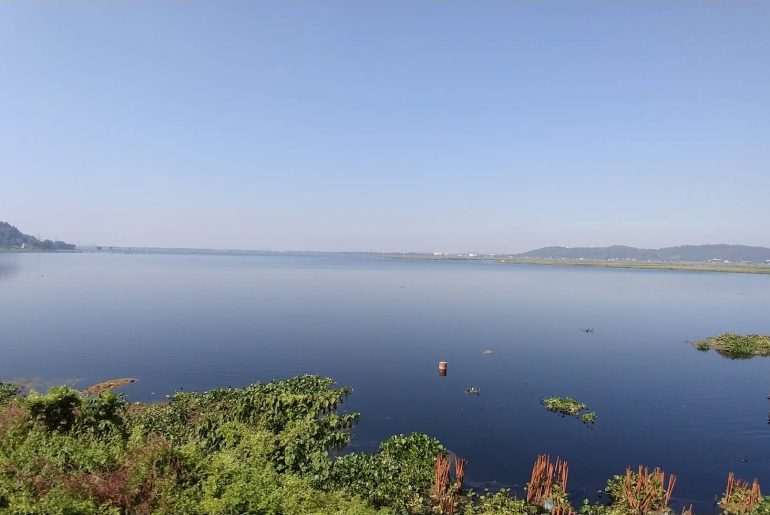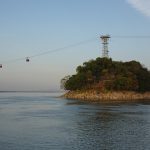Situated in the Kamrup district of Assam, approximately 18 km southwest of Guwahati city, Dipor Bil (also spelled Deepor Beel) is a freshwater lake formed in the former channel of the Brahmaputra River. They are approximately 40 square meters in size. Km, this lake was designated a Bird Sanctuary in 1989 due to its remarkable biodiversity and historical significance.
Dipor Bil is a habitat for a diverse range of unique bird species, making it a prominent tourist destination in Assam. The region’s unspoiled beauty and thriving forest ecosystem provide visitors with a captivating view of the beautiful wetlands.
Around 19,000 rare and endangered bird species can be observed daily at Dipor Bil, attracting tourists from near and far. Recognizing its immense ecological value and wetland characteristics, the Ramsar Convention included it as a Ramsar site in 2002. The winter season is particularly favorable for visiting, as it lures hibernating birds from distant western and southern countries.
In acknowledgment of the high density and diverse avian population that frequents this location annually, Birdlife International has declared Dipor Bil an Important Bird Area (IBA). Substantial measures are undertaken to safeguard the region’s cultural heritage and natural surroundings.
A brief history of Dipor Bil
The origin of the name Dipor Bil can be traced back to its Sanskrit roots, with “Dipor” meaning “elephants” and “bil” referring to a wetland or lake. According to historical accounts, this lakeside area was a dockyard for the Tai-Ahom and the Mughal communities.
Notably, during a specific period, the Kampitha and Rambrai Syiemship, the political authorities of Meghalaya, exercised control over this site, further highlighting its historical relevance.
Dipor Bil’s Flora and Fauna

It is renowned for its remarkable flora and fauna, boasting a diverse ecosystem, abundant biodiversity, and varied wildlife. The lakeside area is adorned with many plant species, including water hyacinths, lilies, aquatic grasses, marshy lands, and vegetation patches.
Research conducted at the site has identified 18 different varieties of phytoplankton, indicating the richness of marine plant life. Notably, rare plants such as Euryale Ferox and Potamogeton crispus have experience in this region.
Moreover, It is a proud habitat for a substantial population of rare and endangered birds. With approximately 19,000 birds gracing the lake on any given day, the area accommodates around 220 bird species, of which 70 are migratory. Some endangered avian species found here include the Spot-Billed Pelican, Lesser Adjutant Stork, White-Bellied Eagle, and Siberian Crane.
Additionally, It hosts a diverse range of other wildlife, with 20 amphibian species, 12 lizard species, 18 snake species, and six turtle and tortoise species recorded within its vicinity. These remarkable attributes attract regular tourists researchers, students, and wildlife photographers to explore the area’s natural wonders.
Importance of Dipor Bil’s
In addition to its ecological significance, Dipor Bil holds excellent utility for the surrounding villages and districts. The lake is a crucial source of fresh water, providing clean drinking water to numerous communities.
Approximately 14 villages, comprising around 1,200 families, rely directly or indirectly on the lake for their livelihoods. Furthermore, Dipor Bil serves as a breeding ground for freshwater fish, contributing to the local diet by providing essential protein and supporting the fishermen’s livelihood through trade.
Dipor Bil is the largest lake (beel) in the Brahmaputra valley of Western Assam. Its importance goes beyond its local impact, as it has emerged as a representative wetland type within the Burma Monsoon Forest biogeographic region.
This classification acknowledges the lake’s broader significance as a distinct and characteristic feature of the region’s wetland ecosystem. Overall, It plays a vital role in providing water, supporting local livelihoods, and representing the unique wetland landscape of the area.
Protection of Dipor Bil
The management and conservation of Dipor Bil fall to the Tourism and Forest Department of Assam. The fisheries department plays a crucial role in preserving and safeguarding the fish population, recognizing their significance as a primary source of livelihood for the local communities.
On the other hand, the Bird Sanctuary is responsible for protecting and conserving the avian species residing in and visiting the lake. Given the substantial presence of endangered birds in the area, concerted efforts must be made to prevent their extinction.
In recognition of the importance of wildlife preservation, the Ramsar Convention designated Dipor Bil as a Ramsar site, ensuring the implementation of appropriate conservation measures. Shooting, hunting, and trapping birds for recreational purposes are prohibited in the area. For birdwatching while minimizing disturbance to the avifauna, tall towers have been constructed, providing an efficient and convenient means for observing the birds in their natural habitat. These conservation efforts aim to safeguard the ecological integrity and biodiversity of Dipor Bil, ensuring the long-term sustainability of this valuable ecosystem.
When to visit Dipor Bil?
Dipor Bil experiences a predominantly humid climate, known as a mesothermal climate, throughout the year. Monsoon season can be wet and sticky, while summers can be scorching.
Winter is the best time to visit the lake, from October to March. The lake’s size decreases during this period, and some cultivation activities occur. Moreover, the temperature during winter is pleasant, providing ideal weather conditions for exploration and enjoyment of the area’s natural beauty.
How to reach Dipor Bil
It is on National Highway 31 (NH 31), approximately 14 kilometers from Guwahati, along the Jalukbari Khanapara pass. To reach Dipor Bil, you can hire a private taxi or drive to the location using your own vehicle.
Conclusion
Dipor Bil, a pristine wetland sanctuary in Assam, offers a captivating experience with its rich biodiversity and rare bird species. As a Ramsar site and an Important Bird Area, conservation efforts are in place to protect its ecological integrity. Winter is the best time to visit, as it is easily accessible via National Highway 31. Dipor Bil is a must-visit destination for nature lovers and those seeking the beauty of Assam’s wetlands.






